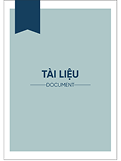Tài liệu
Ownership structure and demand for independent directors: evidence from an emerging market

Xem mô tả
163
Xem & Tải
0
Tóm tắt
Purpose – In this study, we examine how ownership structure affects the use of independent directors in Vietnam – an emerging stock market. Design/methodology/approach – We develop logit and tobit regression models to investigate the effects of ownership structure on the propensity to use independent directors and the number of independent directors on the board, respectively. Insider ownership and the use of independent directors are proposed to have a nonlinear relationship. Findings – With a sample of 1,318 observations collected from 192 listed firms over the period from 2008 to 2017, we find that insider ownership and independent director appointment have a U-shaped relationship. It is positive when insiders hold a small proportion of shares, and turns out to be negative when insiders hold a large percentage of shares. In addition, both state ownership and foreign ownership are negatively related to firm decisions of appointing independent directors. Practical implications – Our findings imply that minority shareholders should have appropriate actions to reduce agency costs and protect their own interests. In addition, policymakers should improve the effectiveness of corporate governance legislation to increase the presence of independent directors in order to protect minority shareholders. Moreover, government agencies also need to increase the number of independent directors in state-controlled firms as a means to improve their corporate governance. Foreign investors may be a substitute for independent directors; therefore, firms without independent directors are able to improve their corporate governance by attracting foreign investors. Originality/value – While the extant literature shows that independent directors can help firms decrease agency costs of equity in financial decisions and performance, there are relatively few studies investigating corporate decisions to use independent directors. This paper contributes to the literature of corporate governance mechanisms through independent directors in emerging markets.
Mô tả
management Science
Tác giả
Tran, Quoc Trung
Người hướng dẫn
Nơi xuất bản
Nhà xuất bản
Kinh Tế Quốc Dân
Năm xuất bản
2020
ISBN
1974-0020
ISSN
Từ khóa chủ đề
Ownership structure , Independent directors , Emerging market , Vietnam
Trích dẫn
Bộ sưu tập
Tệp tin

10-1108_JED-03-2020-0022.pdf
D:\NEU_DSpace\tapchitienganh
Dung lượng: 91.13 KBĐịnh dạng: pdf
Lượt xem: 0 Lượt tải: 0
